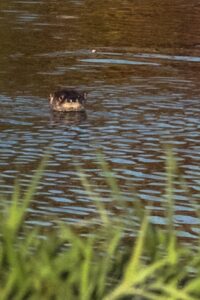By Bob Confer
“You got be otter your mind!”
Claudette Conigliaro, who is a fish and wildlife technician with the New York State Department of Environmental Conservation (DEC), probably gets that response all the time from friends and family when she tells them she’s heading off into the winter wilds to look for evidence of river otters.
Just last week, days before the mid-winter blessing of a brief thaw, she left me a message that she was heading to my family’s farm in Gasport to survey our stream. I really appreciate her love for her job and wildlife, because I had gone 3 weeks without a hike on the farm due to two big snowstorms and constant winds coming off the Niagara Escarpment having made hiking frustratingly difficult with the deep and drifted snow. But, she still went about her job — her calling – and ventured to the waterway.
Despite the initial disbelief one might have over her duties, one quickly realizes it makes perfect sense to chase down otters now — it’s undoubtedly the best time of year because the giant water weasels will leave telltale signs in the snow, such as tracks with a dragging tail and the slides that they use for playing and accessing the water.
It’s also not something new to the biologists. Claudette and her fellow wildlife techs at the DEC undertook such a project in the winter of 2018 when they surveyed 1,192 sites across the state. Think about that — nearly 1,200 locations, which ranged anywhere from a few hundred yards to a few miles of walking, often through knee deep snows in the thick brush that is so often found around creeks and rivers.
This winter they are surveying prior locations and adding more, such as our farm. So, don’t be surprised if you see a DEC vehicle in your neighborhood or an unmarked personal car from which comes someone with waders, showshoes, and a backpack.
If they already did this in 2018, why do it again 4 years later?
Well, the 2018 survey showed that otters were making a comeback in WNY. This year’s survey should show continued expansion of range and population.

The dramatic return of these beautiful animals to this end of the state was made possible by the New York River Otter Project which aimed to restore otters to the watersheds of WNY. Prior to 1990, otters were all but extinct in the region thanks to unregulated harvest, habitat destruction, and pollution. To right those wrongs, from 1995 through 2000, volunteers, colleges, and DEC staff live-trapped otters in the Adirondacks, Catskills, and Hudson Valley and released 279 of them at 16 different locations, primarily in the Finger Lakes and Genesee River valley.
I think the DEC will be in for some pleasant surprises this year. Last summer, I got a call from a friend that river otters were hanging around his son’s dock in a Niagara River tributary. That was the first time, in all his 60-plus years outdoors on the Niagara Frontier, that he saw one of these critters in the wild.
I hope you get that chance, too. You’ve likely only seen otters on television nature shows, going down their slides or floating on their backs with their babies using the adults as glorified pool lounges. They are very large for weasels, reaching lengths of 3 to 4 feet, counting their tails. Adults can weigh anywhere between 10 and 30 pounds. At such sizes, there’s no way they should be confused with mink, which is what many alleged otter sightings end up being. If you are fortunate enough to see an otter, you can help the DEC by reporting your sighting via the “furbearers sightings survey” page on the DEC website.
Otters are a sight to see and they are a creature to experience. They are gregarious and playful, inquisitive and high-strung. “Charismatic” is the best word I’ve heard to describe them.
That fits my lone encounter with one, which happened 10 years ago on Quiver Pond in the Adirondacks. I was far from shore in my kayak when all of a sudden I heard a snort. I turned to see an otter just 3 feet from my boat staring at me. He spent the next 15 minutes going under and around the kayak, periodically coming up to make a number of sounds like whistles and squeals. At one point, he did a remarkable maneuver of kicking his tail and legs underwater with such strength that he elevated his whole upper body out of the water like he was standing up.
It was an experience I’ll never forget. I hope I have more like that one day, whether it’s at the Erie Canal, the Genesee River, or Alma Pond. They’re certainly on the road to recovery and could be at such places already. This year’s survey might show that.
Fingers crossed that otters could soon join other animals that only in recent decades made significant comebacks across WNY, wildlife such as fishers, bobcats, bears, and bald eagles.
This really is an exciting time to be an outdoors enthusiast.







